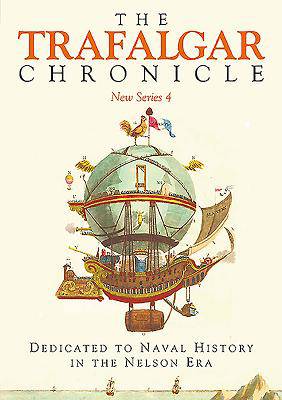
- Retrait gratuit dans votre magasin Club
- 7.000.000 titres dans notre catalogue
- Payer en toute sécurité
- Toujours un magasin près de chez vous
- Retrait gratuit dans votre magasin Club
- 7.000.000 titres dans notre catalogue
- Payer en toute sécurité
- Toujours un magasin près de chez vous
The Trafalgar Chronicle: New Series 4
Dedicated to Naval History in the Nelson Era
Peter Hore
Livre broché | Anglais
27,95 €
+ 55 points
Description
The Trafalgar Chronicle is a prime source of information as well as the publication of choice for new research about the Georgian navy, sometimes also loosely referred to as 'Nelson's Navy', though its scope reaches out to include all the sailing navies of the period. A central theme is the Trafalgar campaign and the epic battle of 21 October 1805 involving British, French and Spanish ships, and some 30,000 men of a score of nations.
The next edition, new series No 4, is themed on the people who knew Nelson, his friends and his contemporaries, as well as technical and scientific changes which were taking place at the turn of the eighteenth century.
Contributions include an article by former US Navy Secretary John Lehman on Stephen Decatur and another by Professor John Hattendorf on Admiral Sir John Gambier, and the observations of American scientist, Professor Benjamin Silliman, who visited Britain in 1805. Other characters who appear are the New York-born Westphal brothers, 'Jack Punch' Perkins who was the first black officer in the Royal Navy, William Pringle Green who was so critical of the results at Trafalgar, and the two Loyalist Richard Bulkeleys, father and son, who served with Nelson at the beginning and at the end of his career. Three articles on technology in the Georgian navy address the surprising developments of the carronade, ballooning and diving in the age of Nelson.
Like earlier editions of The Trafalgar Chronicle, this edition is sumptuously illustrated with some seldom-seen pictures and will appeal to naval and social historians whether they are academics, antiquarians or amateurs, or the reader who is curious to learn about significant but often overlooked aspects of naval history.
The next edition, new series No 4, is themed on the people who knew Nelson, his friends and his contemporaries, as well as technical and scientific changes which were taking place at the turn of the eighteenth century.
Contributions include an article by former US Navy Secretary John Lehman on Stephen Decatur and another by Professor John Hattendorf on Admiral Sir John Gambier, and the observations of American scientist, Professor Benjamin Silliman, who visited Britain in 1805. Other characters who appear are the New York-born Westphal brothers, 'Jack Punch' Perkins who was the first black officer in the Royal Navy, William Pringle Green who was so critical of the results at Trafalgar, and the two Loyalist Richard Bulkeleys, father and son, who served with Nelson at the beginning and at the end of his career. Three articles on technology in the Georgian navy address the surprising developments of the carronade, ballooning and diving in the age of Nelson.
Like earlier editions of The Trafalgar Chronicle, this edition is sumptuously illustrated with some seldom-seen pictures and will appeal to naval and social historians whether they are academics, antiquarians or amateurs, or the reader who is curious to learn about significant but often overlooked aspects of naval history.
Spécifications
Parties prenantes
- Auteur(s) :
- Editeur:
Contenu
- Nombre de pages :
- 256
- Langue:
- Anglais
Caractéristiques
- EAN:
- 9781526759504
- Date de parution :
- 08-02-20
- Format:
- Livre broché
- Format numérique:
- Trade paperback (VS)
- Dimensions :
- 147 mm x 208 mm
- Poids :
- 539 g







